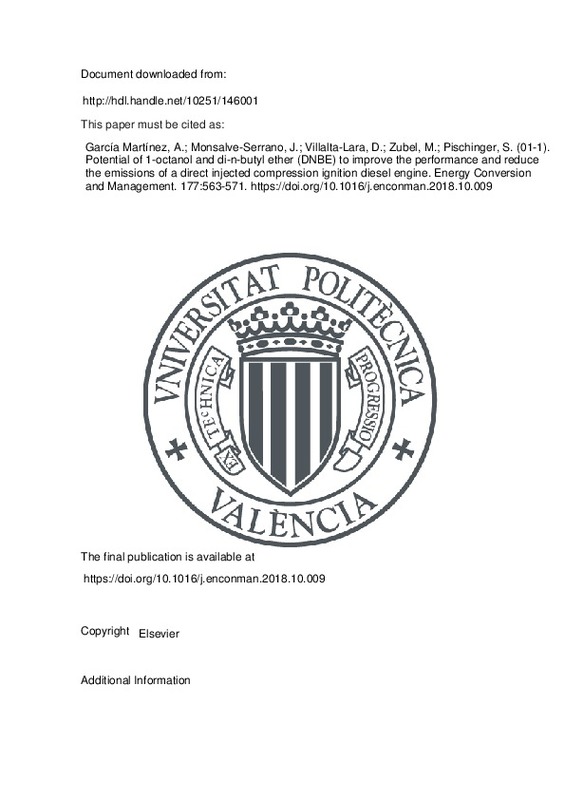JavaScript is disabled for your browser. Some features of this site may not work without it.
Buscar en RiuNet
Listar
Mi cuenta
Estadísticas
Ayuda RiuNet
Admin. UPV
Potential of 1-octanol and di-n-butyl ether (DNBE) to improve the performance and reduce the emissions of a direct injected compression ignition diesel engine
Mostrar el registro sencillo del ítem
Ficheros en el ítem
| dc.contributor.author | García Martínez, Antonio
|
es_ES |
| dc.contributor.author | Monsalve-Serrano, Javier
|
es_ES |
| dc.contributor.author | Villalta-Lara, David
|
es_ES |
| dc.contributor.author | Zubel, Marius
|
es_ES |
| dc.contributor.author | Pischinger, Stefan
|
es_ES |
| dc.date.accessioned | 2020-06-11T03:33:53Z | |
| dc.date.available | 2020-06-11T03:33:53Z | |
| dc.date.issued | 2018-12-01 | es_ES |
| dc.identifier.issn | 0196-8904 | es_ES |
| dc.identifier.uri | http://hdl.handle.net/10251/146001 | |
| dc.description.abstract | [EN] This experimental work evaluates the potential of 1-octanol, di-n-butyl ether and three intermediate blends as substitutes of the diesel fuel to be used in compression ignition engines. For this purpose, performance and engine-out emissions measurements have been done in a single-cylinder engine of 0.39 L displacement and 15:1 compression ratio at four engine operating conditions representative of the new European driving cycle (NEDC) driving cycle. The tests have been done keeping constant the NOx emissions and combustion center for all the fuels at each operating point. To achieve this, the exhaust gas recirculation rate and the start of injection timing were modified simultaneously for each fuel tested, while the rest of the engine settings were kept constant. All the biomass-derived fuels have the same oxygen content but substantially different cetane number and volatility. The results show that, for the same NOx levels, all the fuels allow a substantial reduction of the soot emissions versus diesel due to both the higher oxygen content in the fuel molecule and/or the extended mixing time achieved because of the lower fuel reactivity. In terms of efficiency, all the alternative fuels improve the fuel-to-work conversion efficiency. This benefit comes from decreasing the heat transfer in a greater way than the exhaust losses increase. Moreover, in general terms, all the fuels promote a reduction of the combustion losses to halve of those found with diesel. | es_ES |
| dc.description.sponsorship | The authors gratefully acknowledge FEDER and Spanish Ministerio de Economía y Competitividad for partially supporting this research through TRANCO project (TRA2017-87694-R). This work was performed as part of the Cluster of Excellence Tailor-Made Fuels from Biomass, which is funded by the Excellence Initiative by the German federal and state governments to promote science and research at German universities. Thus, the authors would like to thank the Institute for Combustion Engines, RWTH Aachen University, for all the support to perform the research activities. | es_ES |
| dc.language | Inglés | es_ES |
| dc.publisher | Elsevier | es_ES |
| dc.relation.ispartof | Energy Conversion and Management | es_ES |
| dc.rights | Reserva de todos los derechos | es_ES |
| dc.subject | Fuel blends | es_ES |
| dc.subject | Biomass-derived fuels | es_ES |
| dc.subject | Diesel engine | es_ES |
| dc.subject | Emissions | es_ES |
| dc.subject.classification | MAQUINAS Y MOTORES TERMICOS | es_ES |
| dc.title | Potential of 1-octanol and di-n-butyl ether (DNBE) to improve the performance and reduce the emissions of a direct injected compression ignition diesel engine | es_ES |
| dc.type | Artículo | es_ES |
| dc.identifier.doi | 10.1016/j.enconman.2018.10.009 | es_ES |
| dc.relation.projectID | info:eu-repo/grantAgreement/AEI/Plan Estatal de Investigación Científica y Técnica y de Innovación 2013-2016/TRA2017-87694-R/ES/REDUCCION DE CO2 EN EL TRANSPORTE MEDIANTE LA INYECCION DIRECTA DUAL-FUEL DE BIOCOMBUSTIBLES DE SEGUNDA GENERACION/ | es_ES |
| dc.rights.accessRights | Abierto | es_ES |
| dc.contributor.affiliation | Universitat Politècnica de València. Departamento de Máquinas y Motores Térmicos - Departament de Màquines i Motors Tèrmics | es_ES |
| dc.description.bibliographicCitation | García Martínez, A.; Monsalve-Serrano, J.; Villalta-Lara, D.; Zubel, M.; Pischinger, S. (2018). Potential of 1-octanol and di-n-butyl ether (DNBE) to improve the performance and reduce the emissions of a direct injected compression ignition diesel engine. Energy Conversion and Management. 177:563-571. https://doi.org/10.1016/j.enconman.2018.10.009 | es_ES |
| dc.description.accrualMethod | S | es_ES |
| dc.relation.publisherversion | https://doi.org/10.1016/j.enconman.2018.10.009 | es_ES |
| dc.description.upvformatpinicio | 563 | es_ES |
| dc.description.upvformatpfin | 571 | es_ES |
| dc.type.version | info:eu-repo/semantics/publishedVersion | es_ES |
| dc.description.volume | 177 | es_ES |
| dc.relation.pasarela | S\370023 | es_ES |
| dc.contributor.funder | Deutsche Forschungsgemeinschaft | es_ES |
| dc.contributor.funder | Agencia Estatal de Investigación | es_ES |
| dc.contributor.funder | European Regional Development Fund | es_ES |







![[Cerrado]](/themes/UPV/images/candado.png)

